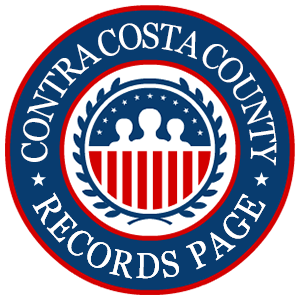Conduct a free Contra Costa warrant search seamlessly and efficiently with this resource’s guidance.
Warrant information is afforded to citizens through the California Public Records Act. Citizens can review warrant details to find out if one has been issued for them or someone else they know. There are various reasons for conducting a warrant search, and the law does not require you to have a specific purpose.
Knowing where to search or the best way to access warrant information is vital for a quick and stress-free lookup; rest assured that this resource covers all you need to know to look up warrants in Contra Costa County, California.
This resource was written by Attorney Robert Bailey Jr, who holds a Juris Doctorate from Widener University School of Law.
Understanding the Contra Costa Warrant Search Process
Before you jump into your first search, use this section to better understand the warrant search process. Information on record custodians, what you need and how to access warrant data will provide the groundwork for conducting your search.
The right to access public government records, including warrants, is afforded through the California Public Records Act.1 This state law also provides for certain restrictions on viewing warrant information.
There are various types of warrants (they will be discussed in detail later), and some are more prone to be restricted from the public. For instance, a major restriction is releasing information that would hinder an active law enforcement investigation.
This exception usually does not impact arrest warrants because law enforcement is actively searching for them. However, a search warrant may be restricted until executed because you would not want to tip someone off and allow them to move or destroy evidence.
When you are ready to perform a warrant search, you will find that there are multiple options. Certain information may be found through online databases while you may have to dig deeper and conduct an in-person search to get additional warrant data. There are also options to submit requests for warrant information via email, mail or by phone.
However, when you conduct your search, make sure you are prepared with certain information. First, make sure you have the complete name of anyone you want to conduct a warrant search on.
Second, you also want to know the county where the person lives. Of course, knowing the county where the warrant is issued is helpful so you can narrow it down to the correct record custodian.
If you are having trouble conducting your warrant search with this information, you may need to provide additional data. A description of the offender (e.g., race, sex, height, weight) may be helpful, as will any information about the warrant, such as why and when it was issued.
You also need to know the record custodian so you know where to begin your search. In Contra Costa County, warrants are issued and maintained by the Superior Court.2
Some cities have their own municipal courts and agencies that are responsible for issuing and maintaining warrants. In Contra Costa, warrant information is only maintained at the county level.
Now that you have a basic understanding, you are ready to learn the specific steps for conducting a warrant search in Contra Costa County.
If you’d like to check other criminal history details too, refer to the Contra Costa County arrest lookup tutorial and the countywide mugshot search overview.
How To Search Active Warrants in Contra Costa County California
If you are ready to conduct a warrant search, the primary record custodian is the Contra Costa County Superior Court. You can start by searching the Superior Court’s Online Database.3
To find warrant information, you have to search for criminal cases with this database. You can search by a case number, person’s name or their attorney. If you are unsure how to spell a person’s name, you can click on the “sounds like” option.
To narrow your search appropriately, under the “case status” drop-down menu, you will have three options for accessing criminal cases with warrants. There is a general “warrant” option as well as two options to search for those that are either ordered or outstanding.
There are other things you can do to narrow your search as well. For instance, you can include a person’s booking number or a filing date range. Once you conduct your search, the results page will provide you with all matching names, case numbers, criminal case types, and court locations.
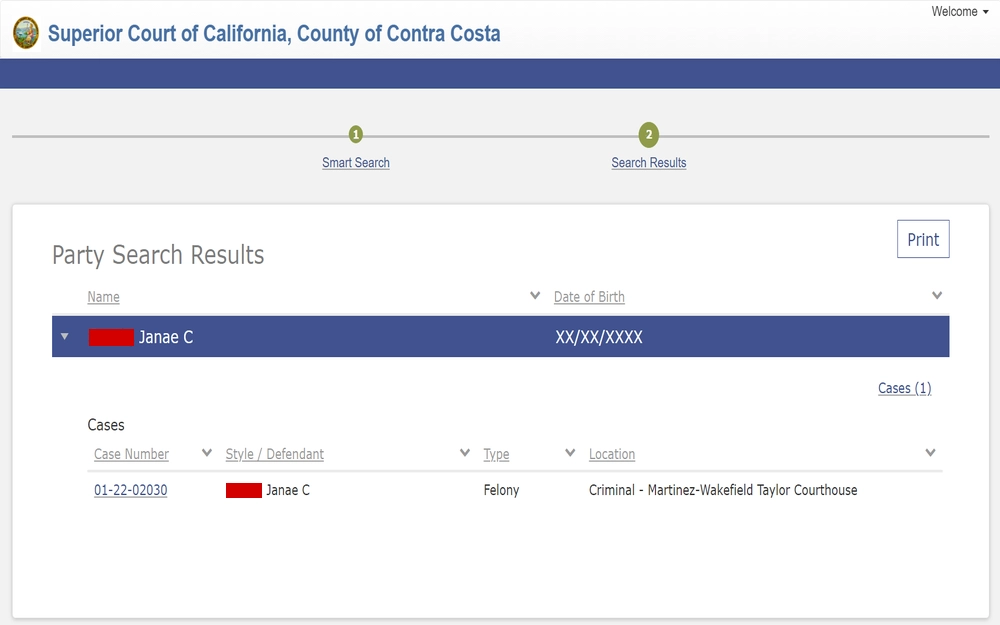
To view warrant information, you will need to view the complete online criminal record by clicking on the case number. On the online criminal record, you can go to the “Events and Hearings” section, which provides you with a list of all events and actions that have taken place in a criminal case.
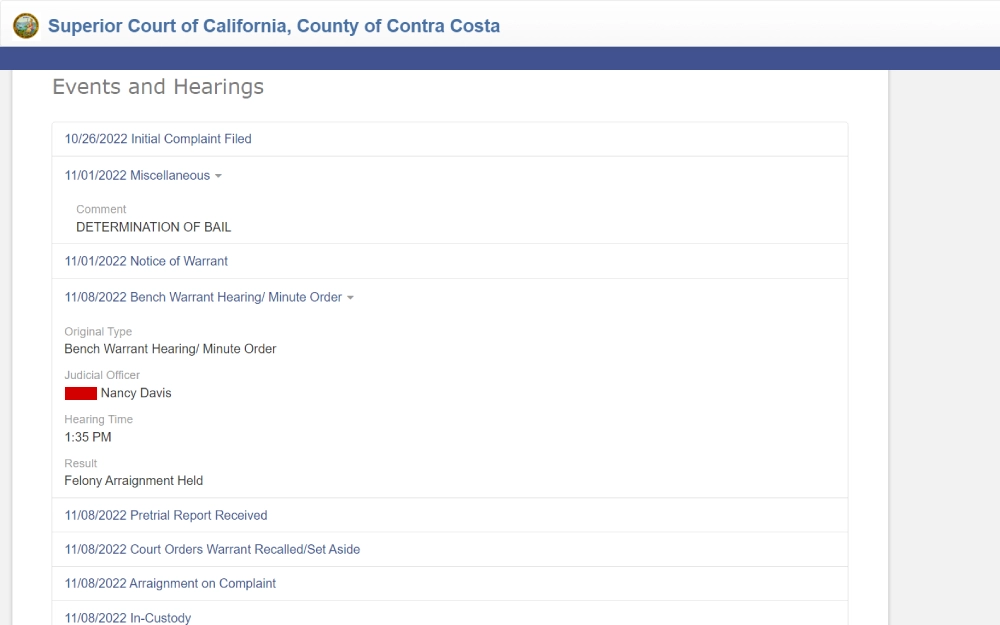
In this section, you will be able to see when the warrant was ordered and issued. You can also see what type of warrant was issued.
While online databases are the most efficient, they usually do not contain the full criminal record. As a result, there is warrant information that you are unable to access online. To get additional warrant information, you will have to make a request directly with the record custodian.
If you need additional warrant information, you can request records in person or by mail directly from the Contra Costa Superior Court.4 The below three criminal clerk’s offices are available for in-person and mail-in record requests:
Martinez Criminal Clerk’s Office
725 Court Street
Martinez, California 94553
Pittsburg Criminal Clerk’s Office
1000 Center Dr.
Pittsburg, California 94565
Richmond Criminal Clerk’s Office
100-37th St.
Richmond, California 94805
If you are submitting a request by mail, you can use their Criminal Record Search Request Form (or this form for payment by credit card).5, 6 All three of these offices are available Monday through Friday, from 8:00 AM to 4:00 PM. To talk to someone at any of these offices, you can call them at 925-608-1000.
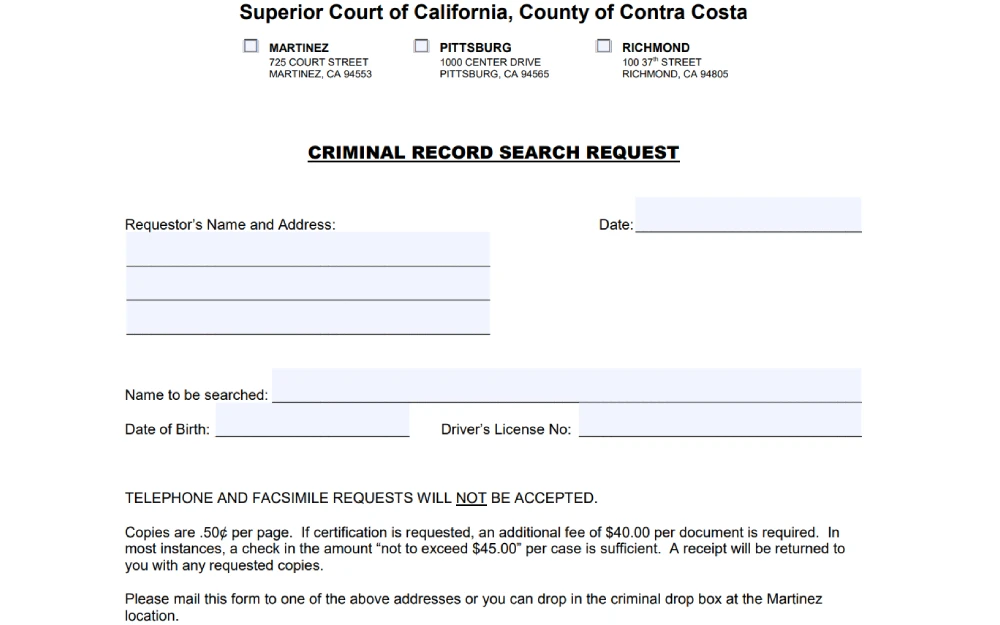
In certain states, there are options to search for warrants in all counties at once. Sometimes, this is through a warrant search tool, and other times through a unified case system. In California, there is not a readily available option to search for warrant information throughout the state.
Various Kinds of Warrants & What Each Signifies
To assist in your search, you should know what different kinds of warrants there are in Contra Costa County, how they are issued, and their ultimate purpose. After understanding more about the various types of warrants, you will be better equipped to conduct a targeted search for the information you are looking for.
The arrest warrant is the most commonly known type and is used to take a person into custody who is alleged to have committed a crime. In order for a judge to issue an arrest warrant, law enforcement must present enough evidence to establish probable cause that a certain person committed a specifically identified crime.
A bench warrant is issued by a judge without the prompting of law enforcement. This type of warrant is issued when an individual violates a requirement of the court.
This may occur when a party does not show up for a scheduled hearing date or if they fail to pay any restitution or fines. A bench warrant can also be issued if an individual commits a violation of their probation or parole.
An alias warrant is similar to a bench warrant but differs in its timing. An alias warrant is issued if a person does not show up for their initial court hearing before they enter a plea. This will also result in an additional charge referred to as a failure to appear.
An extradition warrant can be issued to have a person who is a fugitive be brought back to the location where they committed the crime.
A search warrant deals with evidence, not the custody of a person. A search warrant states that law enforcement can look through a specifically defined area for evidence of a certain type of crime. To have a judge issue a search warrant, similar to those for arrests, a law enforcement officer must present enough evidence to establish probable cause.
A Capias Pro Fine Warrant is issued when a person receives a judgment in court after being found guilty but has failed to make the required payment. This type of warrant can also be issued for failure to pay child support if the other parent files to hold them in contempt of court.
Any of these warrants may be considered “active” if they have not been fully executed or resolved.
How To Handle Outstanding Warrants in Contra Costa County CA
After completing a search, you might wonder what you should do with this information. Well, if you uncover outstanding warrants about yourself, you should take action quickly. If you find an outstanding warrant for someone else, you will have to make a determination based on the severity of the warrant and how well you know the person.
You have an outstanding warrant: If you locate an outstanding warrant for yourself while conducting a search, what you need to do depends on the severity and type of warrant. It may not be apparent from the information you gather, so your first step is to reach out to a licensed attorney who specializes in criminal defense law.
They may be able to guide you on how to resolve the warrant without having to turn yourself in (e.g., reschedule a hearing, pay a fine etc.). They can also instruct you on what to do and your rights if you have to turn yourself into law enforcement.
The typical advice you receive will be to get things set up with a bail bondsman. This will quicken the process if you are able to post bail after you turn yourself in.
Also, let anyone in your family or who is close to you know about the situation. The last thing you want is for your family to be worried and not know what happened to you.
Someone else has a warrant: If you uncover a warrant for a friend, colleague or neighbor, you will most likely want to make sure they are aware so they can resolve it before the situation gets worse. You can either tell them yourself or, if you do not know them well, you can let a mutual friend know who can pass along the information.
If the person is wanted for a violent crime, it’s best to let law enforcement know any information you have. You can submit any information you have with the Contra Costa Office of the Sheriff.7 They will be best equipped to handle a situation with a person that has this type of warrant.
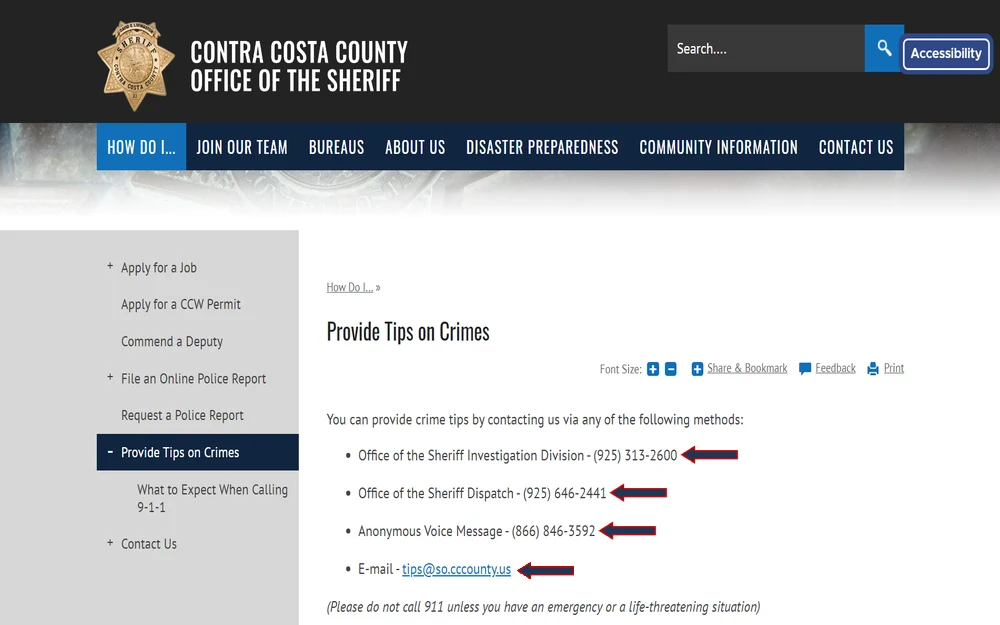
You can now feel confident to perform a Contra Costa warrant search, and are even prepared to resolve your own warrant if necessary; if you’d like to continue in your quest for public information, you can access various Contra Costa County public records (inmates, arrests, court cases, etc.), or expand your search for wanted individuals by tracking down details of anyone wanted in California.
References
1California State Legislature. (n.d.). Government Code – GOV. Retrieved January 19, 2024, from <https://leginfo.legislature.ca.gov/faces/codes_displayexpandedbranch.xhtml?tocCode=GOV&division=10.&title=1.&part=&chapter=&article=>
2Contra Costa County Superior Court. (n.d.). Contact us. Retrieved January 19, 2024, from <https://www.cc-courts.org/contact.aspx>
3Contra Costa County Superior Court. (n.d.). Odyssey Portal. Retrieved January 19, 2024, from <https://odyportal.cc-courts.org/portal>
4Contra Costa County Superior Court. (n.d.). Criminal Records. Retrieved January 19, 2024, from <https://www.cc-courts.org/criminal/records.aspx>
5Contra Costa County Superior Court. (2020, April 29). CR-147 Criminal Records Search Request [PDF]. Retrieved January 19, 2024, from <https://www.cc-courts.org/docs/CR-147-CriminalRecordsSearchRequest.pdf>
6Contra Costa County Superior Court. (2021, May 24). CR-114 Criminal Record Copy Request [PDF]. Retrieved January 19, 2024, from <https://www.cc-courts.org/docs/CR-114-CriminalRecordCopyRequest.pdf>
7Contra Costa County Sheriff’s Office. (n.d.). Provide tips on crimes. Retrieved January 19, 2024, from <https://www.cocosheriff.org/how-do-i/provide-tips-on-crimes>
